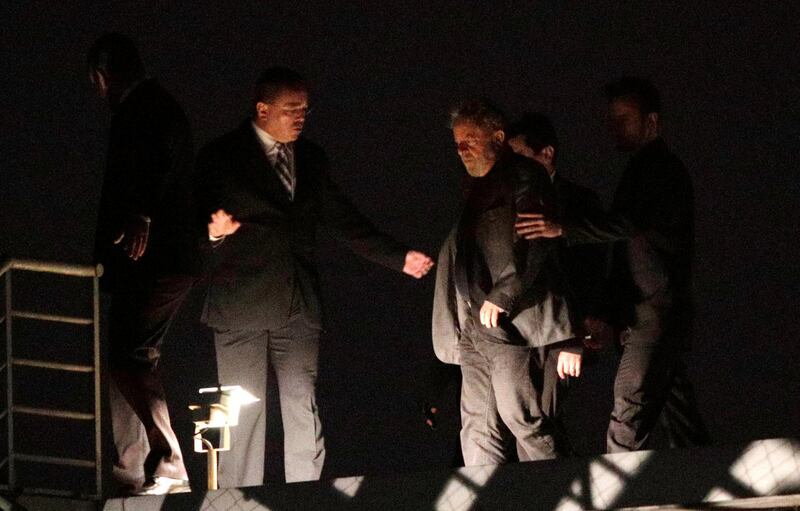Former Brazilian president Luiz Inacio Lula da Silva woke up in jail on Sunday as the first current or former president in Brazil’s modern history to be incarcerated, adding a measure of unpredictability to the country’s upcoming presidential elections.
About 500 supporters remained outside of the jail hours after police shot rubber bullets and sprayed tear gas to disperse them.
The Workers' Party said eight people were injured in the previous night's events and one was taken to hospital. No serious injuries were reported.
“The police cowardly attacked us last night, but we accept that we have to stay outside the perimeter. We will respect it,” said Roberto Baggio, local coordinator of the Landless Workers’ Movement. “We are expecting people from southern Brazil to arrive here today. We are not leaving until Lula is freed.”
Da Silva's fall from grace has unfolded steadily over the past week after the Supreme Federal Tribunal, the country's most senior court, ruled against his petition to remain free while he continued to appeal his 12-year sentence for money laundering and corruption.
But his prison conditions will not be dismal.
Not considered a formal cell, the 15-square-metre room that has been set aside for the former president is located on the fourth floor of the five-story Federal Police building in Curitiba. It is mostly used as a dormitory for agents visiting from other cities across the country.
_______________
Read more:
[ Brazil's Lula declares readiness to go to jail ]
_______________
Brazilian news site G1 reported that da Silva’s room has bars on the outer side of its single window and none on its door. It has enough space for a single bed and a small table now that its usual bunk beds have been removed. It also has a private bathroom with a toilet and a shower with hot water.
Workers’ Party leader Gleisi Hoffmann said da Silva was in a good mood and that she accompanied him in Curitiba until he entered the room where he will serve his sentence.
Meanwhile, opinions about the incarceration of da Silva remain strong in the southern city of Curitiba, which is considered to be the centre of the so-called Car Wash investigation.
Judge Sergio Moro, who oversees many of the Car Wash cases in the city and ordered da Silva's arrest, is often seen as a hero for jailing politicians involved in the widespread corruption scheme.
“There are a lot of people in jail who haven’t even been tried. Lula was sentenced to 12 years in prison, he should have been there already,” said Valmir Oliveira, who works for Parana’s sanitation company. “For the majority that works for this country, this was a relief. He is not above the law. I hope more of those politicians come to Curitiba.”
_______________
From palace to prison: Brazil's ex-president Lula in dates
Brazil's ex-president Luiz Inacio Lula da Silva, better known as Lula, was on Sunday serving his first full day behind bars after receiving a 12-year prison sentence for corruption.
The 72-year-old arrived at the jail in the southern city of Curitiba late Saturday after days of political drama that gripped Brazil, becoming the country's first former leader to end up behind bars.
Here is a list of key dates in the life of one of the world's most popular politicians.
- October 27, 1945: Lula is born to a poor farming family in Brazil's northeast. His family moves when he is seven to the state of Sao Paulo to escape hunger.
- 1975: He becomes president of the metal workers' union, having worked in that sector since the age of 14.
- 1978-80: At the height of the military dictatorship, Lula leads major strikes in the industrial suburbs and is jailed for a month for his role.
- 1980: Lula co-founds the leftist Workers' Party (PT) and goes on to take part in the creation, in 1983, of the Unified Workers' Central (CUT), which becomes Brazil's largest trade union federation.
- 1986: He is elected to Congress.
- 2003: Lula becomes Brazil's first leftist president after winning election in the previous year. He is re-elected in 2006 for a term ending in 2010.
- 2016: The Supreme Court blocks his appointment as chief of staff to President Dilma Rousseff, his handpicked successor. She is then impeached in August after allegations of financial wrongdoing.
- July 2017: Lula is found guilty of receiving a bribe from a Brazilian construction company in return for contracts with state oil giant Petrobras. He is sentenced to nine and a half years behind bars.
- January 2018: He loses an appeal and his sentence is increased to 12 years and one month.
- April 5, 2018: After losing an appeal to delay the start of his sentence, Lula is ordered to turn himself in within 24 hours. He defies the order but later agrees to comply.
- April 7, 2018: Shortly before midnight, Lula becomes an inmate at the federal police headquarters in Curitiba.
_______________
A few houses around the federal police building flew Brazilian flags, which have become a symbol of those who wanted da Silva jailed. But detractors had largely left the area around the jail, and downtown Curitiba was quiet on Sunday as residents seemed to go about their day.
Da Silva will be held far from other prisoners in the building, who are located on the second floor.
Some of those being held in the general lockup area are also charged with crimes related to the Car Wash corruption scandal, such as Antonio Palocci, a former minister in da Silva’s government, and Leo Pinheiro, the former president of construction firm OAS, who testified that the flat at the centre of da Silva’s case was reserved for the former president as part of a bribe.
During his time at the jail, da Silva will be on 24-hour watch and will be given two hours outside each day. His three meals will be served with plastic utensils and he will be allowed to receive visitors on Wednesdays.
If Judge Moro had not ordered that da Silva be held in the special room, he could have gone to a prison like Complexo Medico Penal de Pinhais, in greater Curitiba, where former Workers’ Party treasurer Joao Vaccari is jailed.
The towering political figure, who had originally defied an arrest warrant and hunkered down in a metal workers union where he began his rise through the ranks of Brazilian politics, will continue to appeal his corruption conviction from jail.
He is the latest high-profile Brazilian to be ensnared in the Car Wash investigation, in which several of the country's political and business elite have been arrested over the last four years.
He is also leading preference polls ahead of October’s presidential election.






